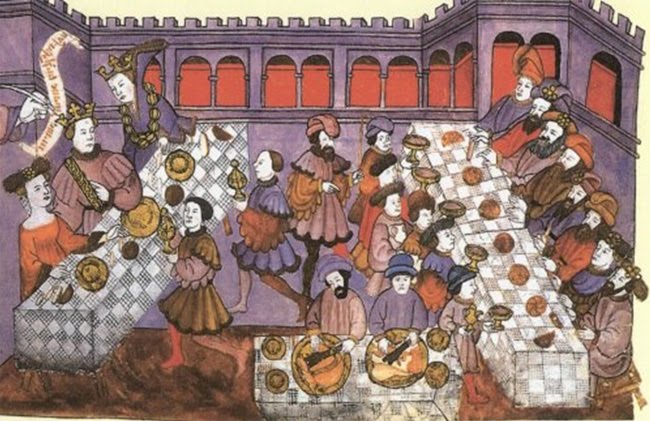The Feast of the Innocents
A late autumn tradition for over two thousand years, food is prepared and served in great quantities at special trestle tables set up specifically for the event. The benches consist of, quoth the various texts, a...
There is joy, and celebration, certainly. Good cheer, and whirling traditional dances that fling one from partner to partner in a maelstrom of silk and expensive wigs? Of course.
There is usually a boom in childbirth forty weeks after this holiday feast, if you catch our meaning. Wink, wink? Nudge, nudge?
But, the next day, a different atmosphere pervades the air around the detritus of revelry. Food is gathered, and preserved, from the leftovers. Sedate processions of citizens clad in brown, rough-spun robes and hoods then carry, or pull (on little hand-wagons designed especially for this annual holiday feast) what is left to the local magister's office, or post office, if the homestead is that far out on the frontier. They gather before the building, in a public square or park, and present the left-overs to the magistrate, chanting a hymn as one voice, about The King's Share.
"...goodly-sized tree of hickory; or of cherry; or of yet another fragrant hardwood; split down the middle, or as close-to as the grain and knots of said felled tree permit. Making half-moon braces out of the log-ends, place the makeshift pews upon them, thus to sturdy them. Line wide trestle tables with platters of roast duck, and pork, and of beef and mutton. Let our people revel in the freshness of the bounty granted to us, here, upon Tellus..."...and it goes on for quite some time in the same vein. The traditions have shifted laterally over the centuries, but never the reason for the feast, nor for the rituals and rites performed the next day.
There is joy, and celebration, certainly. Good cheer, and whirling traditional dances that fling one from partner to partner in a maelstrom of silk and expensive wigs? Of course.
There is usually a boom in childbirth forty weeks after this holiday feast, if you catch our meaning. Wink, wink? Nudge, nudge?
But, the next day, a different atmosphere pervades the air around the detritus of revelry. Food is gathered, and preserved, from the leftovers. Sedate processions of citizens clad in brown, rough-spun robes and hoods then carry, or pull (on little hand-wagons designed especially for this annual holiday feast) what is left to the local magister's office, or post office, if the homestead is that far out on the frontier. They gather before the building, in a public square or park, and present the left-overs to the magistrate, chanting a hymn as one voice, about The King's Share.
History
The history of the holiday is very complex and convoluted, and shrouded in controversy, but it boils down to a celebration of the populace rising up in defiance of unfair taxation, which had been raised to one-third of a family's gross income. For the purposes of taxation, "family" includes everyone who lives on the same plot of land with one another, which has caused more than a few problems.
Execution
A giant feast is held, from first light until the next dawn. Then at noon, at the next noontide, the people of the town, or neighborhood, or village, or farmstead would walk in procession to the Chancellor of the Exchequer. Or, if the settlement is too small, the eldest hale member of the citizenry. They then distribute it to the needy of the area, with the help of the local children.
Components and tools
There are ritual trappings for carts and wagons, and traditional roughspun wool robes are worn by the processors. They swing a censor loaded with a piney, earthy scented incense during the procession as well, and the 'eldest hale member of the citizenry' is given a tabard and medallion to wear for the day, and a pure gold and silver replica of the medallion to keep and hand down as an heirloom.
Participants
The eldest of the citizenry, and the teenagers of the village/township/neighborhood distribute food and supplies for the needy at the beginning of the winter months.
Observance
Late autumn, every year, just after harvest; 1 Vader has become the default day in most of the country.
Primary Related Location
Related Ethnicities

Comments